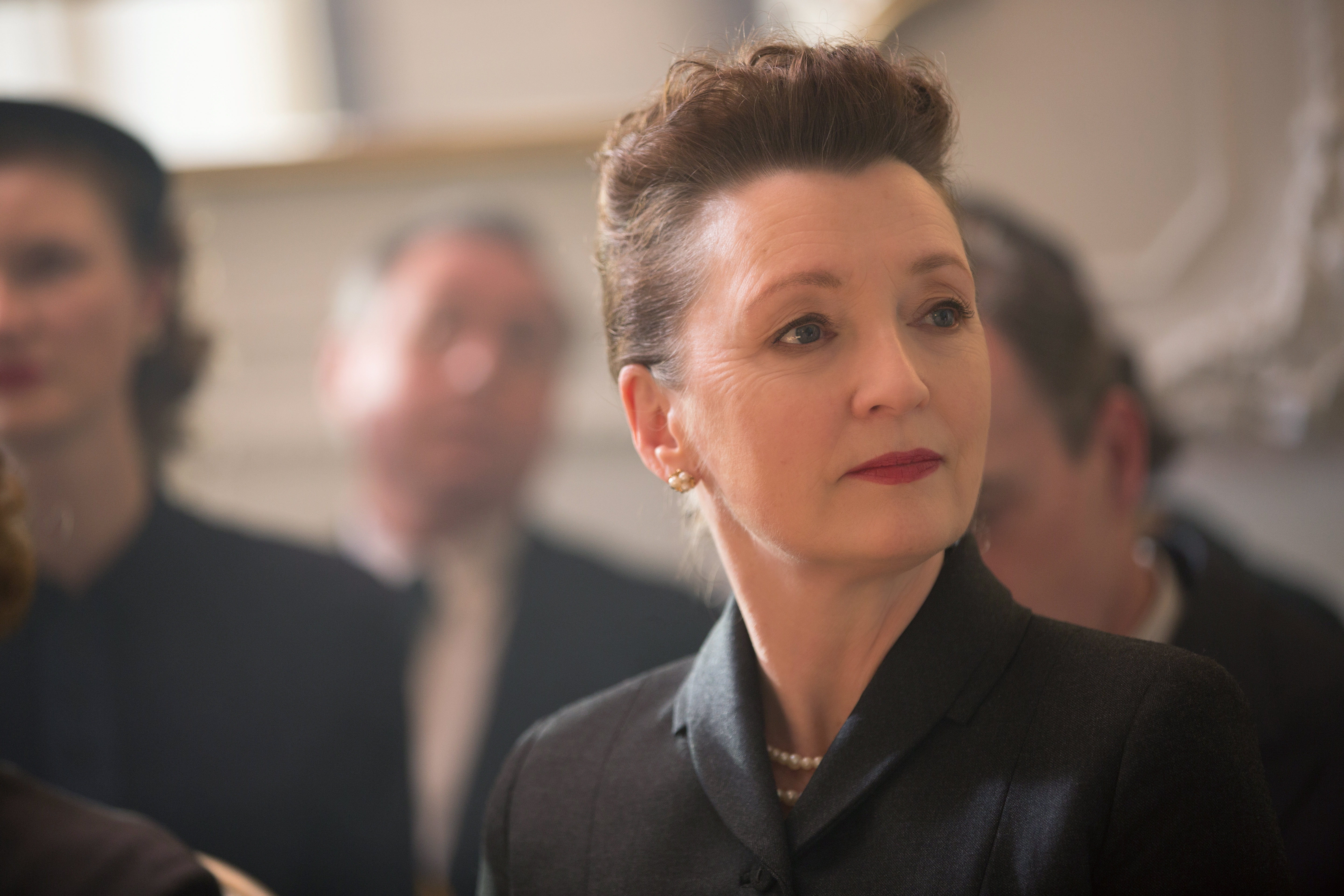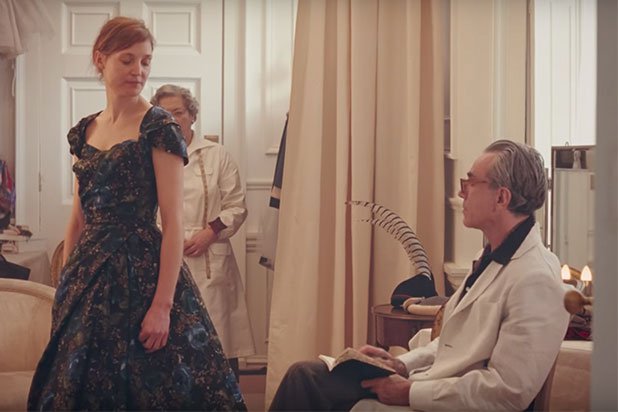MOVIE REVIEWS |
INTERVIEWS |
YOUTUBE |
NEWS
|
EDITORIALS | EVENTS |
AUDIO |
ESSAYS |
ARCHIVES |
CONTACT
|
PHOTOS |
COMING SOON|
EXAMINER.COM FILM ARTICLES
||HOME

Thursday, January 18, 2018
ESSAY
Objectification, Patriarchy And Resistance In 1950

Leslie
Manville as Cyril in Paul Thomas Anderson's drama "Phantom Thread".
Leslie Sparham/Focus Features
by
Omar P.L. Moore/PopcornReel.com
 FOLLOW
FOLLOW
Thursday,
January 18,
2018
Warning: This essay contains spoilers.
If you plan to see "Phantom Thread", and I highly recommend you see it in
theaters (and in 70MM) then please be advised not to read any further.
(This is the third in a series of essays on "Phantom Thread".)
Freedom and restraint. Who had freedom in 1950's London? It is
clear: men did. Rich men certainly did.
Just over 30 years prior to the time period depicted in "Phantom Thread" women
in the United Kingdom had won the right to vote.
Overall women in the U.K. had the right to vote but were restrained in most
every other way. While monied women could certainly vote and prosper
(Barbara Rose is one of them, an independently wealthy person in "Phantom
Thread"), most other women in lower societal strata were not heard from.
With "Phantom Thread" there is a Rorshach test: women have a predominant voice
in the film yet are largely seen not heard. Even Cyril (Lesley Manville),
who has authority over the Woodcock brand, is quiet for the most part in Paul
Thomas Anderson's film. It is Cyril's facial expressions and minimalism
that speak volumes. Cyril however, seems very much inured to patriarchal
whims, contained by ordered routine and empowered by it. Routine
is a way of keeping distance for Cyril, and a work ethic and strict rigor means
control.
Every other woman in "Phantom Thread" though, is attuned to 1950s patriarchal
protocol except three: Alma (Vicky Krieps), Barbara Rose (Harriet Harris) and a
woman Reynolds (Daniel Day-Lewis) has dressed and meets at a dinner who points
out to him a "glow that comes with a first marriage". Each woman is
independent and has wealth except Alma.
Barbara Rose has money and is about to be married to a Dominican man who is also
wealthy. ("In my country her money stays her money, and my money is mine,"
to paraphrase.) By and large in the 1950s women typically had less freedom
than they enjoy now. So in general any forward-thinking woman in 1950s
London would likely be either stifled, shunned or suppressed by their husbands
and by extension men. Monied women however, obviously tended to have more
confidence about their status financially and that presumably extended to other
areas of life. And in "Phantom Thread" any woman in beautiful gowns and
dresses made by the House Of Woodcock not only felt like a million pounds they
felt loved. Truly loved.

Vicky Krieps as Alma and Daniel Day-Lewis as Reynolds in Paul Thomas Anderson's drama "Phantom Thread".
Leslie Sparham/Focus Features
The independence Barbara Rose has is stripped bare, literally, in one scene.
Before that she has compelled a very adverse Reynolds to attend her wedding
party gala. Reynolds disposes of powerful women like Barbara Rose by
refusing to dress them or by taking dresses from them. It is a way of
taking love from these particular women: breaking up with them by no longer
designing dresses for them. There is intimacy in the building and fitting
of the dresses Reynolds designs -- then a cold, unsentimental and brutal removal
of them.
Reynolds disposes of his love for his finished creation. In turn the love
and self-esteem a woman feels when wearing a Woodcock dress disappears once the
dress has been removed. Cyril keeps close note and references these women:
"she's waiting for you to fall in love with her again", she observes,
recommending that one woman is overstaying her welcome in Woodcock couture.
Cyril is in a sense patriarchy's gatekeeper and certainly a protector of
Reynolds's heart. Perhaps Cyril is jealous.
In the House Of Woodcock Reynolds's dressing of women is the way to their hearts
in "Phantom Thread" and there is an inherent objectification in how these
dresses attach to the wearer. That objectification, whether in Reynolds's
initial measuring of Alma or when the camera gets in close to the bare backs of
women and the tightness or snug fit of a dress fastener or straps, is contrasted
with an abiding warmth for women of a "slender" dimension: words sewn into the
garments by Reynolds, with the name of the wearer of the dress. The words
or names are like love letters.
Alma is an audacious woman for her time and challenges Reynolds not for the sake
of challenging him but for the sake of saving him. Alma sees Reynolds for
who he really is, and sees that she can love him in the manner of a mother to
her rescued child. Alma's unbridled confidence is not really resistance to
patriarchy, it is more a resistance to the wall of dresses and rules and
strictures she sees Reynolds hiding behind. Alma is her own person,
confident, a critic of a staid culture that traps women in dresses and leaves
them to wither away. Her confrontation with Reynolds is the key one in Mr.
Anderson's film, as she burrows her way into exposing Reynolds as the vulnerable
creature he is.
The woman Reynolds speaks to at dinner appears to play the role of provocateur,
a stirrer of passions and drama. There is tongue-in-cheek to the exchanges
but the woman (whose name I forget) speaks of her nephew (Brian Gleeson) getting
too familiar with Alma. "She's barely looked at you this evening has
she?," the woman notes. It is a cheeky moment of comic relief but also a
play on male possessiveness.
Usually in period film dramas you see a man not letting the woman he is with out
of his sight, essentially attached at the hip. But Reynolds is no
socializer -- as he notes in one scene "it's not what I do" -- he is a designer.
His social limitations at parties are clear. Reynolds is socially inept.
Abusive. Churlish. Reynolds respects the women he dresses until he
doesn't. Reynolds respects royalty but he doesn't respect women who no
longer fit the mould of Woodcock.
Related: Previous essay -
A Boy's Best Friend Is The Dresses He Designs
Related: Original essay -
Fashion and Fascism in "Phantom Thread"
Related: "Phantom Thread"
review
COPYRIGHT 2018. POPCORNREEL.COM. ALL RIGHTS RESERVED.  FOLLOW
FOLLOW
MOVIE REVIEWS |
INTERVIEWS |
YOUTUBE |
NEWS
|
EDITORIALS | EVENTS |
AUDIO |
ESSAYS |
ARCHIVES |
CONTACT
| PHOTOS |
COMING SOON|
EXAMINER.COM FILM ARTICLES
||HOME

 FOLLOW
TWEET
FOLLOW
TWEET
 FOLLOW
FOLLOW